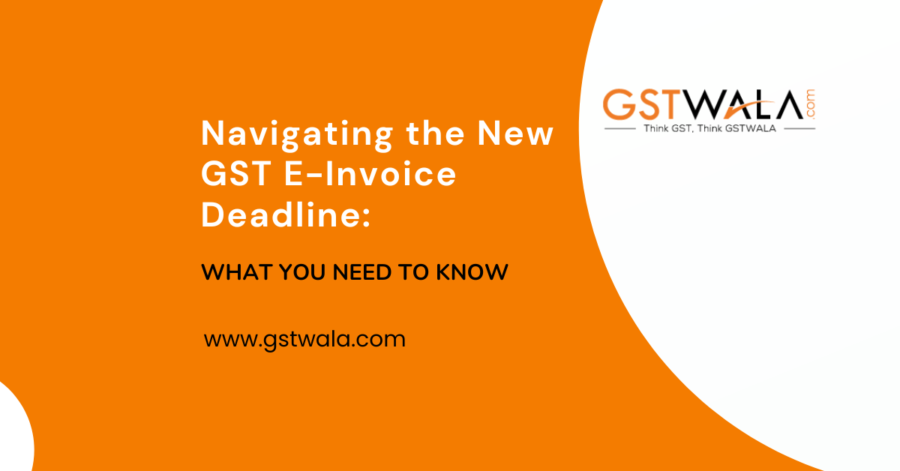
Navigating the New GST E-Invoice Deadline: What You Need to Know
As of November 1st, India’s Goods and Services Tax (GST) system is undergoing significant transformations, ushering in a new era marked by stringent regulations and procedural changes. Among these pivotal shifts, one that stands out prominently is the introduction of a strict 30-day timeline for issuing e-invoices under GST. This alteration represents a seismic shift in the regulatory landscape, with far-reaching implications that reverberate across various sectors and industries, particularly for businesses with turnovers exceeding Rs. 100 crore.
The imposition of a mandatory 30-day deadline for issuing e-invoices under GST signifies a departure from the previous norms, which allowed for greater flexibility in invoicing practices. This change is aimed at enhancing transparency, streamlining processes, and bolstering compliance within the GST framework. By mandating the issuance of e-invoices within a fixed timeframe, the authorities seek to expedite the flow of information, minimize delays, and curb instances of tax evasion and fraud.
For businesses operating in sectors with turnovers exceeding Rs. 100 crore, the implications of this regulatory change are particularly pronounced. These entities, often characterized by their large-scale operations and extensive networks, are now required to adapt to the new invoicing regime expeditiously. Compliance with the 30-day timeline necessitates a comprehensive overhaul of existing invoicing practices, including the adoption of robust technological solutions and procedural reforms to ensure timely and accurate invoice generation.
- 30-Day E-Invoice Deadline:
- A groundbreaking development is the imposition of a 30-day deadline for issuing e-invoices under GST, primarily targeting businesses with annual turnovers surpassing Rs. 100 crore.
- Non-compliance with this deadline will lead to the inability to generate e-invoices post the 30-day window. Transactions failing to meet this criterion will be deemed invalid, with recipients losing eligibility for input tax credit.
- Mandatory Compliance:
- Unlike previous advisories, the 30-day deadline is now compulsory on the GST e-invoice portal. This shift aims to prompt businesses into promptly issuing e-invoices and ensuring adherence to GST regulations.
- Two-Factor Authentication:
- Another notable change involves the implementation of two-factor authentication for taxpayers accessing the portal. This additional layer of security necessitates an OTP (One-Time Password) along with standard login credentials, fortifying protection against unauthorized access and safeguarding taxpayer information.
- Applicability of Two-Factor Authentication:
- Effective November 1, the two-factor authentication requirement applies to taxpayers with turnovers exceeding Rs. 20 crore. This authentication mechanism primarily impacts the e-invoice and e-way bill systems, integral components of the GST framework.
The implementation of a 30-day deadline for issuing e-invoices within the Goods and Services Tax (GST) framework represents a momentous development in India’s tax landscape, signaling a concerted effort to modernize and streamline invoicing practices across the board. This new regulation, introduced with the aim of enhancing efficiency, transparency, and compliance, carries profound implications for businesses of all sizes, but particularly for larger enterprises operating with turnovers exceeding Rs. 100 crore.
At its core, the enforcement of this 30-day deadline reflects a strategic shift towards greater digitization and standardization within the GST regime. By mandating a fixed timeframe for the generation and transmission of e-invoices, tax authorities seek to expedite the processing of transactions, minimize administrative burdens, and mitigate the risk of tax evasion and fraud. Moreover, the adoption of e-invoicing holds the promise of facilitating seamless integration with other digital platforms and systems, thereby fostering a more interconnected and efficient tax ecosystem.
Furthermore, the introduction of two-factor authentication for taxpayers surpassing Rs. 20 crore turnover signifies a proactive step towards bolstering data security and thwarting unauthorized access to the GST portal. These updates underscore the government’s commitment to fostering transparency, efficiency, and security within the GST ecosystem, ultimately benefiting taxpayers and the broader economy.
Stay ahead of the curve with gstwala.com;
together, let’s simplify GST for a smoother business journey.
We are just a click away info@gstwala.com
